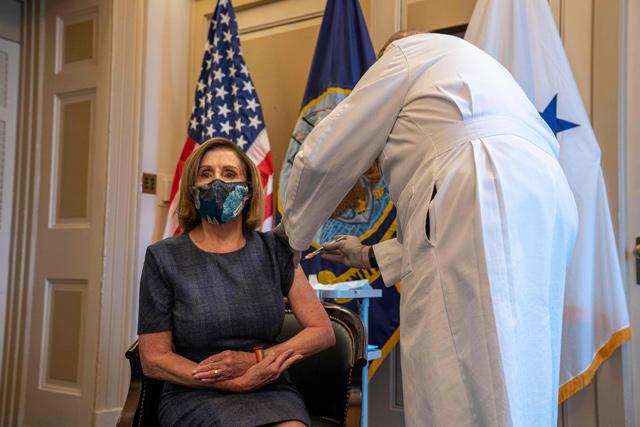You are here
Global jabs pass half a billion as WHO seeks vaccines for poor nations
By AFP - Mar 28,2021 - Last updated at Mar 28,2021

A senior citizen receives a dose of the Chinese-made Sinopharm vaccine, at a vaccination centre in Karachi, on Friday (AFP photo)
PARIS — Health officials have rolled out more than 510 million coronavirus vaccine doses around the world, but with big gaps between countries the World Health Organisation (WHO) on Friday appealed to richer nations to donate vaccines to help poorer ones start inoculations.
Despite the huge effort to get jabs into arms, the pandemic is still surging in Europe and Latin America — where Brazil has now passed 300,000 deaths and Mexico 200,000.
And the deployment of vaccines is chronically unequal, with the United States accounting for more than a quarter of the global total and poorer nations lagging far behind wealthier ones.
The WHO called for millions of COVID-19 vaccine doses to be donated so every country can start immunising within the first 100 days of 2021.
UN health agency chief Tedros Adhanom Ghebreyesus called for "10 million doses immediately as an urgent stop-gap measure so these 20 countries can start vaccinating their health workers and older people within the next two weeks".
"We are still in the acute phase of the pandemic," added WHO technical lead Maria Van Kerkhove.
Serbia might be able to help as it expands an immunisation campaign that has outpaced most of Europe, thanks to a heavy reliance on the Chinese-made Sinopharm jab.
The Balkan state, which has already administered than two million doses to its seven million population, on Friday invited migrants and citizens of neighbouring countries for a jab of the AstraZeneca vaccine.
'Acute phase of pandemic'
Rich EU countries are still struggling to get their inoculations into overdrive, prompting angry outbursts from France.
President Emmanuel Macron said there was a "new type of world
war".
“We are looking in particular at Russian and Chinese attacks and attempts to gain influence through the vaccine.”
His foreign minister, Jean-Yves Le Drian, accused Britain of “blackmail” in its vaccine dealings with the EU.
However, Moscow — whose Sputnik V shot is being rolled out in numerous countries across the world — quickly hit back with Kremlin officials saying they “absolutely disagree”.
But Berlin said it would be happy to use Sputnik V if it gets approval from EU regulators.
Germany also classified the whole of France as a high-risk zone, which means travellers need to show a negative COVID test and quarantine upon arrival.
France itself is stepping up travel controls with daily cases nearly doubling since the start of the month to reach over 45,000 on Thursday.
2.7 million dead
With more than 2.7 million people dead from a virus that first emerged in China in late 2019, leaders everywhere are under pressure to ensure vaccine supplies.
An AFP tally of global vaccinations showed more than 512.91 million does had been administered by Friday, with 133 million in the US and 91 million in India.
But infections continue to rise at a worrying rate, with more than half-a-million cases recorded worldwide in just the last week, according to AFP data.
Vaccines cannot come quickly enough to Brazil, which is suffering from an outbreak that has now killed more than 300,000 from 12 million infections.
‘Biggest genocide’
The political heat was turned up on President Jair Bolsonaro on Friday when his predecessor accused him of presiding over the “biggest genocide” in the country’s history.
“We must save Brazil from COVID-19,” said former leader Luiz Inacio Lula da Silva, adding: “Brazil will not withstand it if this man continues to govern in this way.”
Further north, Mexico is also suffering a brutal third wave, with only a tiny proportion of the population vaccinated so far.
Adriana Meneses remembers vividly when her husband Carlos Hernandez became the country’s first victim of an illness that was unknown almost exactly one year ago.
“We were harassed by the neighbours and on social networks. They threatened to burn down our house,” she said.
“Today, unfortunately, we are part of the statistics.”
The virus has forced governments in all parts of the world to impose drastic restrictions — from curfews and lockdowns, to school closures and travel bans.
Much of Europe is living under a regime that restricts travel and economic activity, and Kenya became the latest African country to order a partial lockdown on Friday, shutting schools and bars in and around the capital Nairobi.
“I am convinced that the cost of not acting now would be far greater,” said President Uhuru Kenyatta.
In India too a sharp rise in infections will see new measures with worst-hit state Maharashtra, including its mega-city Mumbai, put under night curfew from Sunday.
The nation of 1.3 billion people as a whole has a seen a renewed surge in cases in recent weeks, dashing hopes at the start of the year the pandemic had been beaten.
Related Articles
WASHINGTON — The US green-lit the Pfizer-BioNTech COVID-19 vaccine late Friday, paving the way for millions of vulnerable people to receive
BRUSSELS — The EU on Wednesday agreed to lift coronavirus restrictions for US travellers as Western countries moved towards a return to pre-
WASHINGTON — The United States on Friday authorised Moderna's COVID-19 vaccine for emergency use, paving the way for millions of doses of a


















